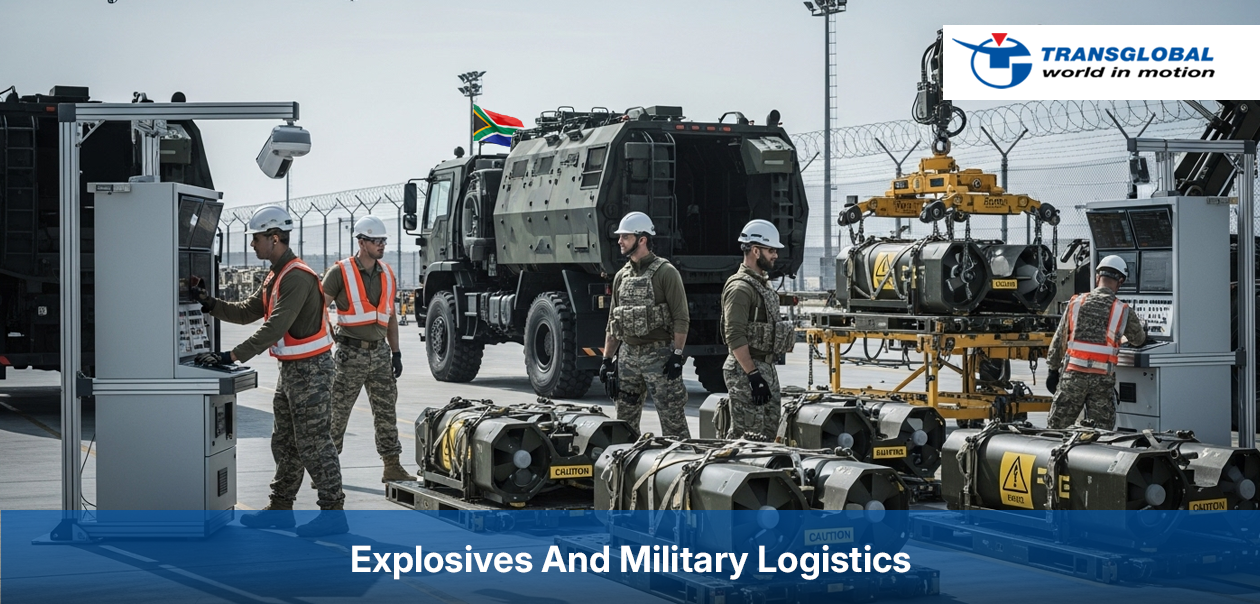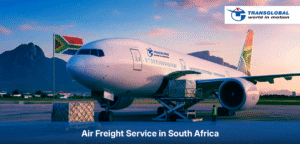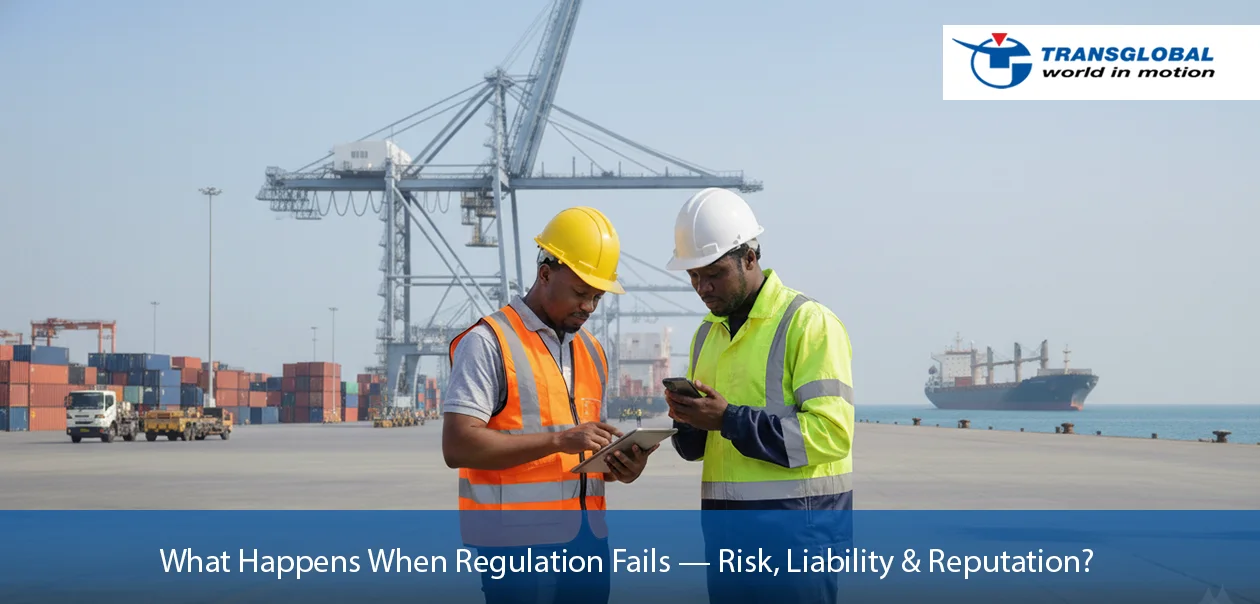Imagine being tasked with transporting tonnes of explosive materials, military-grade cargo, or highly sensitive project freight, not just across borders, but through complex customs, unpredictable weather, and high-risk zones. Now imagine doing it with zero tolerance for error.
That’s the daily reality for specialized freight forwarders like us, Transglobal Cargo.
Our expertise in handling dangerous goods is redefining what safety and precision truly mean in logistics.
Whether the explosives used in mining, military equipment headed for defense projects, or hazardous chemicals required for critical industries, these shipments don’t get a second chance. Here’s how logistics professionals tackle this high-stakes operation with absolute control.
The Nature of Explosives and Military Cargo
Not all freight is created equal. When it comes to Class 1 explosives, weapons, ammunition, or sensitive defense equipment, logistics moves from being a supply chain to a security chain.
Explosives and military logistics:
- Must comply with international conventions like IMDG, IATA, and ADR.
- Require controlled storage, route planning, and secured transport vehicles.
- Face multiple layers of clearance, including defense, customs, and border security.
- Often includes high-value or restricted cargo, demanding real-time tracking and confidentiality.
And here’s where the best freight forwarders make a real difference. We don’t just move shipments; we engineer secure, compliant, and smooth end-to-end transportation.
Precision Starts with Planning: Route Risk Assessment and Permits
Before a single truck hits the road or a plane leaves the tarmac, planning is already in motion. We, as logistics experts, begin with risk assessment, analyzing geopolitical risks, weather conditions, regional restrictions, and infrastructure limitations.
We determine:
- Which routes allow hazardous goods?
- Are there any no-go zones due to political instability or sensitive borders?
- Do neighboring countries accept transits for dangerous cargo?
Once the safest route is selected, permits and government clearances follow. This can include:
- Explosives transport licenses
- Military cargo authorization from the defense ministries
- Port and airport security coordination
- Local escort requirements
Without this groundwork, the entire operation could face costly delays or worse, legal violations.
Custom Packaging and Containerization: Safety Begins at the Origin
You can’t throw explosives into just any container.
Handling military and explosive cargo demands specialized packaging solutions, UN-certified containers, double-locking seals, temperature-controlled systems, anti-vibration pallets, etc. Freight forwarders work with dangerous goods consultants to:
- Match cargo to container standards
- Label shipments with Globally Harmonized System (GHS) codes
- Use tamper-proof tracking and RFID systems
- Provide shock and tilt indicators to monitor handling quality
This level of detail isn’t just best practice, it’s often mandatory by international regulation.
Trained Personnel and Secure Fleet Management
You need more than good drivers to handle dangerous cargo. You need certified professionals like us. We understand the chemistry of the cargo, the behavior of explosives under stress, and what to do in case of emergency.
Key elements include:
- Drivers and handlers trained in DG regulations
- Emergency response knowledge (first aid, fire handling, etc.)
- Use of secure, GPS-enabled, tamper-proof vehicles
- Convoy operations or government escorts (especially for military loads)
At Transglobal Cargo, for example, every movement is monitored by our operations control team with real-time visibility and escalation protocols.
Customs Clearance Without a Hitch: Avoiding Delays and Disputes
Military and hazardous goods shipments often get held at customs, not because something’s wrong, but because documents aren’t perfect or the authorities need extra validations.
As a trustworthy freight forwarder, we ensure the customs clearance process:
- Proactive liaison with customs, defense, and homeland security units
- All documentation is pre-vetted (MSDS, DG declarations, licenses, certificates)
- Clearance officers are aware in advance of sensitive cargo movement
- Every form complies with both the origin and destination country norms
- With clearance done right, the cargo keeps moving without friction.
Cross-Border Coordination in Southern Africa: Think Beyond South Africa
Transglobal Cargo, though rooted in South Africa, plays a vital role in enabling cross-border logistics across Namibia, Botswana, Mozambique, Zimbabwe, and beyond.
Here’s how regional reach matters:
- Mining and military operations often span multiple countries.
- Explosives for blasting may be needed in Zambia, while the supply chain begins in Johannesburg.
- Forwarders must align with local road rules, language barriers, border operations, and government relationships.
By being both compliance-savvy and culturally-aware, we enable smooth cross-border transport in a region with vast infrastructure and regulatory differences.
Real-Time Visibility and Risk Control
The ability to see what’s happening at every stage of the journey can’t be overstated, especially when you’re moving military-grade goods.
Modern freight forwarders utilize:
- IoT-based GPS tracking
- Geofencing alerts for route deviation
- 24/7 control tower monitoring
- Automated alerts for delays, incidents, or temperature shifts
- Integration with client-side visibility platforms
This ensures that stakeholders, governments, manufacturers, and defense departments are always informed, and any risk is acted upon immediately.
Why Specialized Freight Forwarders Matter More Than Ever?
In a world facing rising geopolitical tensions, strict border security, and booming defense contracts, the demand for secure, precise, and professional logistics handling is climbing fast.
This isn’t just about trucks and warehouses, it’s about trust, compliance, and risk-proof execution.
Specialized forwarders like Transglobal Cargo, we bring:
- Over a decade of hands-on expertise in dangerous goods
- 360° knowledge of Southern African terrain and regulations
- A proven safety record
- End-to-end solutions from permits to delivery
When failure is not an option, choosing a generalist logistics provider isn’t just risky, it’s reckless.
Conclusion
Transporting explosives or military cargo isn’t a job, it’s a mission. And missions require precision, discipline, and the kind of logistics partner who understands what’s at stake.
At Transglobal Cargo, we don’t just move goods, we move them with confidence, care, and complete compliance.
Whether you’re in South Africa or across the Southern African region, if your cargo demands the highest level of safety, let’s talk.
Get in touch with our specialized freight forwarding team today.
Frequently Asked Questions
What qualifies a freight forwarder to handle explosives?
They need DG certifications, trained staff, secure transport, and strong compliance with global and local safety regulations.
Does Transglobal Cargo handle cross-border military shipments?
Yes, we manage military and hazardous cargo across South Africa and neighboring countries like Botswana, Zimbabwe, and Mozambique.
What safety steps are followed during transport?
Secure packaging, certified containers, trained teams, GPS tracking, and emergency protocols are all part of the process.





Comments